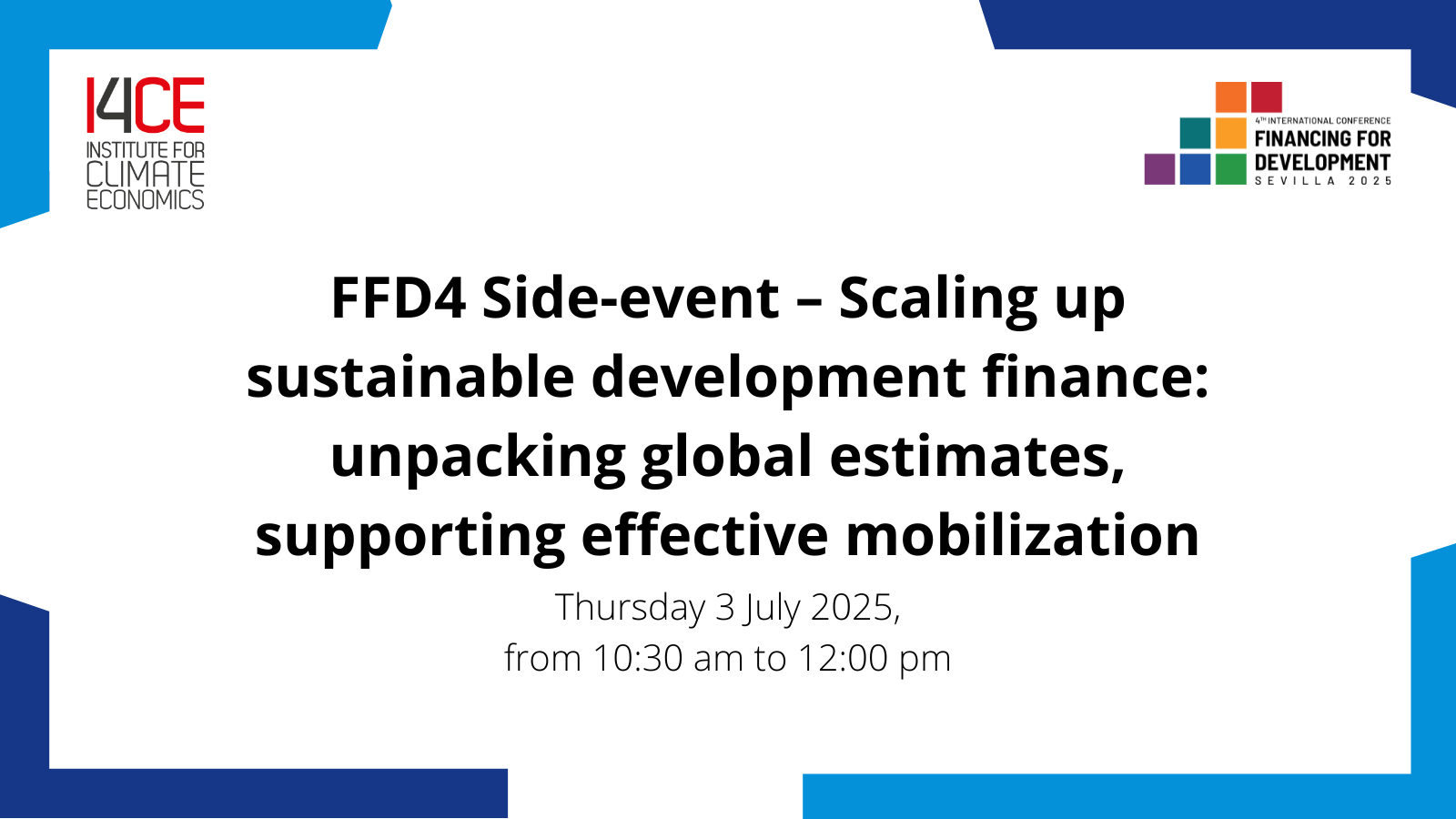FFD4 Side-event – Scaling up sustainable development finance: unpacking global estimates, supporting effective mobilization
Conferences - By : Solène METAYER / Sébastien POSTIC, PhdDate: Thursday 3 July 2025,
Time: 10:30 am -12:00 pm
Organizers and co-hosts
- Institute for Climate Economics (I4CE)
- ODI Global
- Frankfurt School of Finance and Management (FS)
- International Institute for Sustainable Development (IISD)
Location: FIBES Sevilla Exhibition and Conference Centre, Room Side event 18
Contact information for inquiries
More informations about the FFD4
Description of the event
Achieving the Sustainable Development Goals (SDGs) by 2030 demands an unprecedented scale-up of sustainable development finance. Current estimates place the SDG financing gap at approximately $4 trillion per year by 2030. The third IHLEG report estimates that development-aligned climate action in EMDEs, excluding China, will require around $2.4 trillion annually by the end of the decade.
These figures offer valuable signals for raising awareness and structuring international negotiations. However, they often fall short of guiding concrete country-level action or supporting effective mobilization strategies. Several key limitations undermine their practical usefulness.
Many estimates rely on either an incremental, climate-additive costing approach or a holistic, development-pathway framing. Yet, the distinction between these logics is often left implicit or blurred in the final figures, limiting interpretability and comparability.
Existing global estimates frequently overlook cost of capital dynamics, institutional capacity requirements, and realistic allocation scenarios. They answer “how much is needed,” but not “how it should be delivered” – a crucial gap as the quality of finance takes center stage in current policy debates. Needs assessments rarely translate into guidance on how specific financing instruments, sources, or institutional actors can support particular project types, country contexts, or policy priorities.
The objective of the event was to discuss these challenges from three complementary angles:
- Unpacking existing estimates: We will critically assess the construction, assumptions, and limitations of major financing needs assessments, to enhance their usefulness for international negotiations, better support mobilization strategies, and ultimately support SDG and climate outcomes more effectively.
- Enhancing adaptation figures: While climate change adaptation is vital to integrated climate-development strategies – especially in EMDEs –, it remains underrepresented in financing needs assessments. This session will refocus attention on this critical gap.
- Tracking progress and adapting strategies: We will explore how to report progress on complex, cross-cutting initiatives such as the G20 Sustainable Finance Roadmap. This means complementing the measurement of finance volumes with qualitative assessments that can track moving targets at country level across the sustainable finance policy landscape.
The discussion was grounded in three research initiatives:
1. An analysis of financing needs estimates for EMDEs, focusing notably on the IHLEG climate and development figures. This work is led by I4CE as part of a wider Bruegel-CEPR report.
2. An on-going work by ODI on adaptation financing needs, and how this discussion should feature on the current climate and development finance talks.
3. A new generation of sustainable finance indicators to allow G20 public actors to comprehensively track their contribution towards achieving the G20 Sustainable Finance Roadmap. This project is conducted by a consortium made up of the Frankfurt School of Finance and Management (FS), GFLAC, I4CE and IISD.
The event will feature 45 minutes of presentations of insights from the three initiatives above, and 45 minutes of panel discussions and reaction by financial institution representatives and relevant policy-makers from Planning and Finance Ministries.
Below is a draft agenda:
Draft Agenda
10.30 am – From headline trillions to actual millions: climate financing needs estimates in the age of implementation (I4CE)
10.45 am – Scaling up finance for climate: the road to Belém (ODI)
11.00 am – How to track progress on the G20 sustainable finance roadmap? (FS)
11.15 am – Panel discussion – Moderated by IISD
-
Muhammed Sayed – Development Bank of Southern Africa
-
Carolina Grottera – Ministry of Finance, Brasil
-
Florian Arneth – Ministry of Foreign Affairs, Germany


